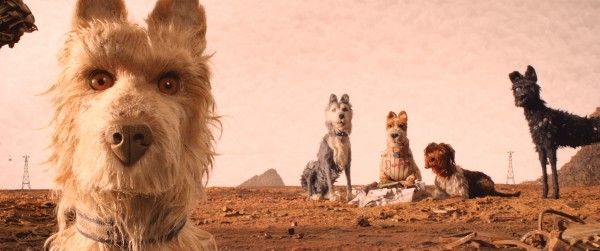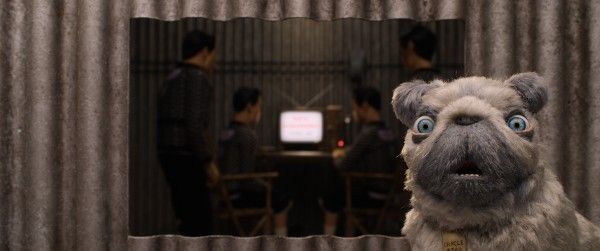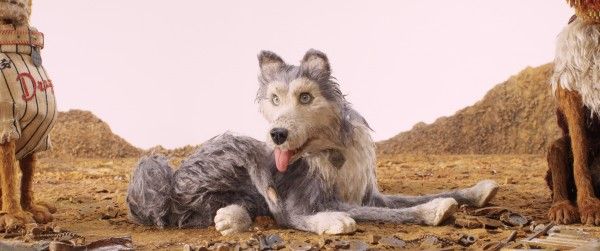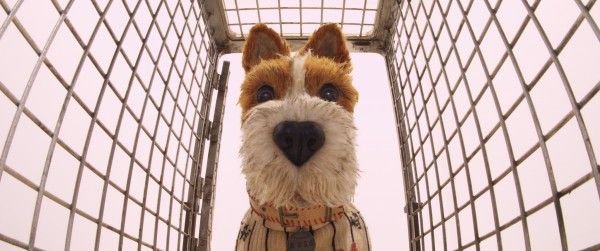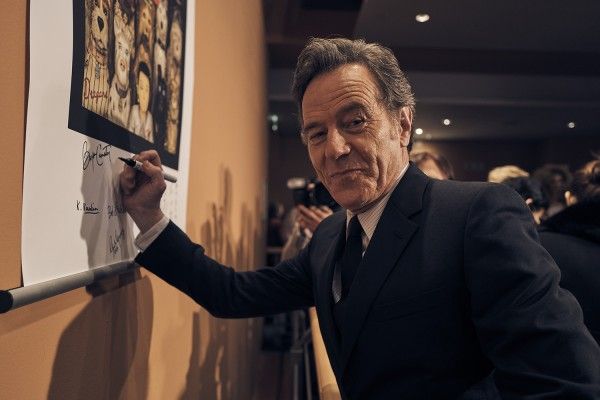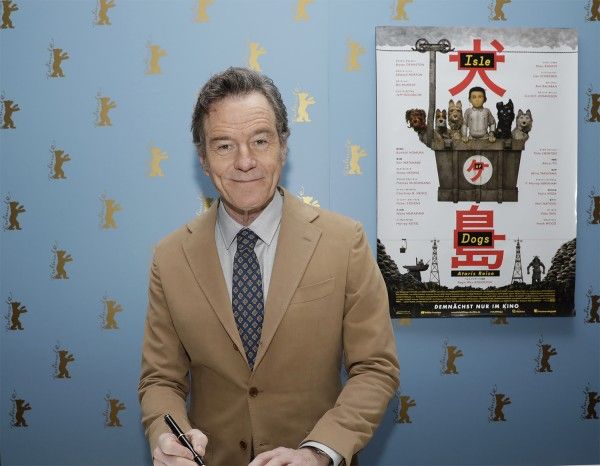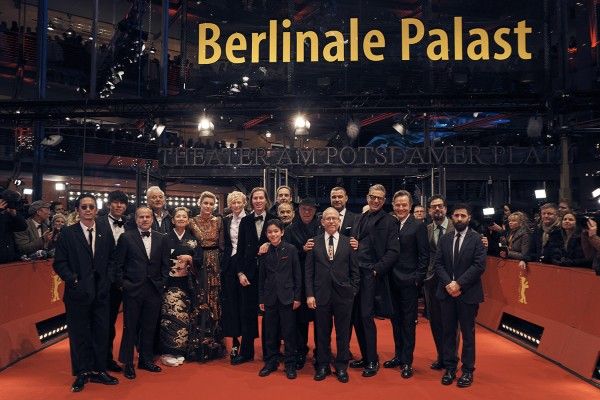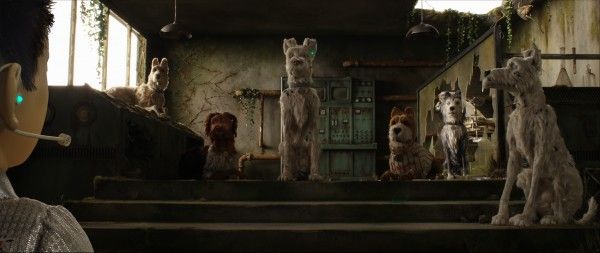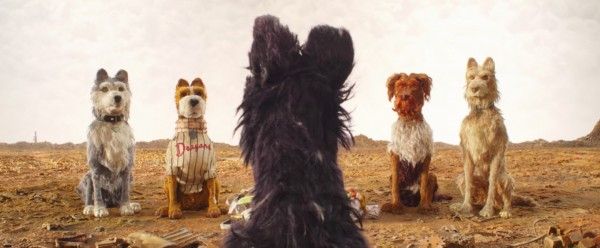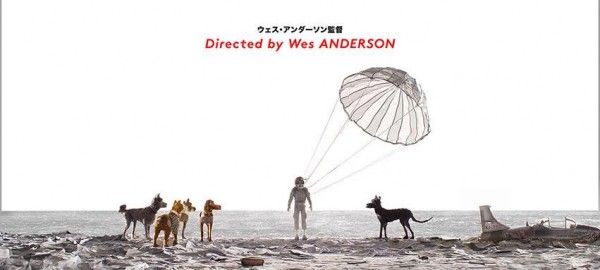Let’s get the most important thing out of the way first: I absolutely loved Wes Anderson’s Isle of Dogs. As a huge fan of his first stop-motion movie, Fantastic Mr. Fox, I wasn’t sure he could top such a special film — but I’m pleased to report he did. And while I loved everything about Isle of Dogs, I have to give a special shout out to the production design and level of detail in every shot. It’s like Anderson took what he did in Fantastic Mr. Fox and amplified it by ten. Trust me, Isle of Dogs is one of the best stop-motion films I’ve ever seen, and strongly recommend checking it out.
With the film expanding nationwide this weekend (to see where it’s playing in your area click the link), I recently got to participate in a roundtable interview with Bryan Cranston at the Berlin Film Festival. During the wide-ranging conversation he talked about how he got involved in the project, how the minute he heard it was a Wes Anderson project he said yes, the subtext and themes of the story, and a lot more. Plus, he talks about doing Network on stage in London, his process for choosing what project he wants to work on, Twitter, and more. If you’re a fan of Bryan Cranston, it’s one of those really fun interviews that I’m confident you’ll enjoy.
If you’re not familiar with Isle of Dogs, the film takes place in a near-future Japan where, after an outbreak of dog attacks, all dogs have been banished to live on a garbage-filled island—the Isle of Dogs. A young boy ventures to the island in search of his own dog, and with the assistance of a pack of newly-found mongrel friends, he begins an epic journey that will decide the fate and future of the entire region. The film also features the voices of Liev Schreiber, Bill Murray, Scarlett Johansson, F. Murray Abraham, Tilda Swinton, Kunichi Nomura, Harvey Keitel, Akira Ito, Akira Takayama, Koyu Rankin, Yoko Ono, Courtney B. Vance, Greta Gerwig, Frances McDormand, Bob Balaban, and Jeff Goldblum.
Check out what Bran Cranston had to say below.
BRYAN CRANSTON: Let me just say... there’s too much fucking laughter at this table.
QUESTION: (laughs) Well, just knowing you and having a reputation and such an appreciation for writing, I imagine that having the opportunity to work with someone like Wes Anderson must have been something that you were kind of anticipating, no?
CRANSTON: Not anticipating.
No?
CRANSTON: But hoping.
Sure. Well, that's kind of what ...
CRANSTON: Yeah. I mean, I think three words came out before I said yes. "Wes Anderson wants-" "Yes." And I don't know ...
It was probably your car.
CRANSTON: Yeah, aw shit. I read the script. I didn't even know what character he wanted me to play, but I was kind of hoping it would be Chief because he had ...
Oh really?
CRANSTON: Oh yeah. He had the most meat, and he was the most damaged. (laughs) I can relate to that. I seem to play a lot of damaged characters.
So you find out that he's interested in working with you, and then you get the script?
CRANSTON: Yeah.
Can you talk about that initial talking with him? When did he give you the script?
CRANSTON: The script came along with a note saying, "I like your work. I'd love to have you consider this." And so, oh jeez, God, yeah, let's do that. In the very, very fortunate position I find myself in, sometimes surprisingly, I'm able to now work with really great auteurs and really wonderful storytellers. It almost doesn't really matter what he wanted me to do. I'd have done it, because from his film history, we know that we're going to experience something that is eclectic and unique. The way he opens up to the worlds that we're not familiar with, I love that.
When I write, even screenplay books say write from what you know. Write what you know. Be an expert within your circle. And that's great. Yes, okay, that makes sense. But what Wes does, he seems to open that up and write what he imagines. By doing that, he opens up that can of worms. He's got to go learn that culture, that language, that sensibility. He's got to pull that in. He creates more work for himself and agonizes over it, as any good writer, I think, does, and has a lot of care and consideration. And he's a lovely man, just a lovely man who is open and congenial and collaborative. It's great.
He makes up these worlds that we sort of want to inhabit somehow, even if it's an animated world.
CRANSTON: You want to live on Trash Island?
Well, you kind of want to be around those guys. There's some human attachment that you find within that impossible situation. I want to meet your character. I want to meet Spot. I want to hang out with them.
CRANSTON: Do you really?
Yeah.
CRANSTON: I bite. I'm the one who bites. Well, to me, I look at it and I see a lot of sociopolitical interplay here. Here we have five members of different species, well, same species. Different kinds of dogs, and they all get along. They figure it out. Now, perhaps the de facto leader is this guy, who's so aggressive that the others, like okay. And in that world, might makes right a lot of times. But he's aggressive because he feels he has to be. He's a homeless dog. He doesn't know where he's going to live. He doesn't know if he's going to eat that day. He's got to be protective and territorial, at least through insecurity or anxiety or all those things. So he becomes the alpha dog. Edward Norton's character is the beta dog, right? And you see the pecking order, and you see how Edward Norton's dog steps up when the other dog steps up. It's the pack mentality.
But they seem to make it work somehow. They accept each other. I think there's a lot of lessons in there of acceptance. I look at it and I go, wow, there are layers of greed in here, of lessons of greed, of xenophobia, of fearmongering, the immigrants' situation, casting aside fear, being able to stay ignorant and point the finger at some group out of fear and ignorance. We're swirling in something.
Let's face it, man, our country ... Are you all Americans? Most of you? A few of us.
CRANSTON: We're swirling right now. We're in a downward spiral, I think. Now, it's not the first time in history and it won't be the last, I don't think. But it really feels that way. At some point, hopefully, civility and normalcy and common sense will band together, and that movement will bring us out of that. That's what I'm hoping for. I'm hoping that it happens sooner rather than later. But right now we're in the muck and mire. We're on Trash Island.
I'm really curious about this, because yesterday at the press conference, it was clear we'd all seen the movie beforehand, and many of us thought that based on seeing it, but when Wes was asked about it, he sort of tried to defer off political themes in the film. Just in your experience with him, I'm curious. Do you think that's just his nature to not want to go down that road? It was a surprising answer at the press conference. He sort of deflected a little bit.
CRANSTON: I don't know. I mean, I think if you ... It's so personal. I don't know. He certainly has ... It certainly wasn't a mistake, the depth of this storytelling. However, I'll say that they started working on this four years ago. This was way before Brexit and Trump and all that. So he was definitely feeling a sense of something, a movement that was happening, and he's on the vanguard of it. Boy, that's really prescient art, when you can be forward thinking in that ... I don't know.
I mean, perhaps in an environment like that, where it's so big, it could be misconstrued. You don't have the time to be specific on something, on spelling something out. It also has the tendency to divert the attention away from the opening of the Berlin Film Festival. So you have to be more circumspect and say, "Well, this is more for great to be here. This is lovely." You have to be thoughtful about that.
Does Wes talk about that kind of stuff with you or others?
CRANSTON: I think we talk ... We don't make it a habit to say, "This film is about ..."
Right, but I mean when you're talking about the script and when you're going to shoot, is there a discussion of the subtext?
CRANSTON: Oh yeah. Oh yeah, it's like, wow, this feels like it's going down this road. It's like, yeah. Well, there's a lot do to with this, you know? I mean, again, we did our recording two and a half years ago. Two days. We worked on it for two days. He worked on it for four years. So it's a very different experience for actors on this. It's like we went into a bakery and got a croissant. We stayed very ... "I'll take that and that. Great, thank you." And he's like, there, baking. He has a very different perspective on it because he has to have the meta vision of it, and we come in with a little slice. “How about this? Yeah, that works.” “Okay. How about that? Okay, yeah, that's good.” And he becomes a conductor. “A little bit more of this, and a little softer. Now big.” He's operating.
It's so fascinating that you just did this for two days. With so many animated projects, they change so much in production. And this you guys recorded two and a half years ago, and it's exactly what you recorded.
CRANSTON: There was one thing. I was doing a film in Pittsburgh and I got a note from Wes saying, "Can you add these lines, or can you say these lines?" I was like, "Yeah." So I would add two or three lines, but that was about it.
Wow, that's pretty ...
CRANSTON: Amazing, yeah.
So we've been asking people today, and they've agreed or confirmed that last night was the first time they saw the film. Is that the same for you?
CRANSTON: No, I saw it in ... Wes lives in England primarily, and I'm doing a play in London.
Right, right.
CRANSTON: He came to see the play early in November and then asked me if I wanted to see it. I said, "Yeah, of course, I'd love to see the movie." So my wife and daughter and I went to see the movie in his editing bay at a hotel, and saw it. It was a little longer. He was very open. He said, "What ... Do you have notes? Do you have thoughts?" I go, "Well, let me ..." I said a couple things, and then let's go think about it. My daughter, who's an actor, my wife, who is an actor, and myself were thinking about it and talking about it. Loved the movie, and we wrote down a collective thing of notes.
More Chief. (laughs)
CRANSTON: Can't get enough Chief.
Whoever did Chief is great.
CRANSTON: Atari should get out of the picture earlier. Chief should be, yeah. Chief should be the new mayor of ...
What notes did you give him? Anything specific that you could mention?
CRANSTON: I think the one thing that I remember, it's like ... This is four months ago. At the end, he made the change. I said ... He didn't have, where Atari would go up and make his speech, and the dogs weren't there. I said, "I feel like we've followed this story, this pack of dogs, and for them not to be in the denouement felt a little ..." He'd go, "Oh yes, yes, yes." So he made sure the dogs were there to keep at bay, and they were all involved.
It must have been such a symphonic work compared to ... I can't even imagine reading this movie as a script. It's so visual and there's so much going on. There are so many little details that I'm sure weren't in the script.
CRANSTON: That's right.
Were you kind of just overwhelmed?
CRANSTON: And it evolved too, as he's ... "Oh, no, that's right. I thought originally I want that. I want this." So, no, we're looking at it, but with ... When you're dealing with someone like Wes, you just give over to it.
Oh, sure, but when you saw it, were you overwhelmed? Were you just like, "Oh my God, this is so much more detailed?"
CRANSTON: Yeah.
This world is so much more elaborate than I could have even imagined.
CRANSTON: Could not have imagined it. I didn't get the sense, the power of the drums and the quietness and the narrat- it's like, oh wow. And you have this sense like I'm experiencing something I don't think I've experienced before, this kind of storytelling. It's really lovely to be a part of something that surprises you.
You're doing Network now in London. This is continuing, right?
CRANSTON: Yeah.
So that is, of course, very explicit social commentary, was relevant in the '70s, is still relevant now, more relevant, possibly, than it was at first.
CRANSTON: Yeah.
This is more sort of subtle, allegorical social commentary, like you said. Do you think one is more effective than the other? What do you think? What sort of relationship do those two have with each other?
CRANSTON: The relationship they have is me. (laughs) I am attracted to ... I just sent out a tweet today, because I have a soapbox. I don't want to be a person without opinion. What's the point? And I don't mind if people disagree with me. I hope that I can be respectful in my disagreement with them. I think that's what we need more of. We need more of this discourse. I think it was written by Paddy Chayefsky, Network, back in the mid '70s, over 40 years ago, almost farcical at the point, saying I've got the terrorist hour, I've got the death hour. We've got a book that commercials on the death hour. It's like, well, what are we seeing on television? "You're about to see is very graphic. We warn you. What you're about ..." It's like oh my God. We're seeing the hangings. We're seeing the ... It's like the slaughters. I mean, look at what happened in the States the other day.
It could be very discouraging. It could be demoralizing, even. Our job, really, as citizens of the country, of any country, is to fight against the apathy of that, is to fight against the giving up and saying, "This is not how people should live. This is not acceptable." Our country was founded on revolt and resistance, and there is always room for that. And you shouldn't be afraid of that. It should help to point out the direction of a problem somewhere.
What kind of projects are you looking for? When you are looking at scripts, when you are choosing projects, I mean, you're doing stage, you're doing animated films, you're doing live action. I'm curious what you are specifically looking for.
CRANSTON: I know it when I read it.
(laughs) [cannot hear what Eric is saying here] the supreme court line about pornography.
CRANSTON: Oh, yes. Not a personal statement on your, "Oh yeah, yeah, just like pornography, yeah.” That's what I keep telling my mom when I'm in the basement. “Mom, the Wi-Fi is out again!"
Sorry, I didn't mean to throw you off.
CRANSTON: I know it when I see it, right? Or whatever, yeah. It's not dissimilar from any of you, any of us who read a novel, and you can't wait to get back to it. You're just like, "Oh, God, what's going on next?" A story that is important, that illuminates an issue that is relevant, that ... And then I look for characters that are integrally involved with that story, that cultivate and motivate that story. Then you talk to the director and say, "Where are you thinking about going with this?" If it seems to jive with what you're thinking, you've got a pretty good chance.
Will that guarantee success? No. If you ask an actor did you know something was going to be successful, they're lying if they said yes. We don't know. We don't know any of that. We hope, and we know we can identify well-written material, but we don't know if something's ... All the stars need to align for something to be successful. Just have to see.
Do you think what we watch changes us?
CRANSTON: Absolutely.
Do you choose projects with that in mind as well?
CRANSTON: I think it's too much to ask for, that something is going to change. Influence? Yes. I think we're all subjected to being influenced by what we see and what we take in. Network is a perfect example, and the idea behind that is to be the guardian of your own consciousness, that you need to protect yourself of what you ingest, because the bombardment of information that we have, and any second we can receive a myriad, a nonstop flow of information. Does that make us wiser people? Does that make us more informed? Maybe not even that. Stimulated, oh yeah, that's there. That's there, but does that help us?
I was telling a friend the other day, he said, "I can't sleep. I can't sleep at all. I'm not sleeping well." "What do you do at night?" "I go through and I go on the computer, and I'm reading [news websites]" Stop there. You are ingesting this kind of aggravation and the talking heads and all the, and the chatter, and that's going on in your sleep. It's like you've got to protect yourself.
So I think yeah, we're influenced by it, but I don't know if ... I think it's asking too much to say, "I'm going to do this to change the world." It's like saying, "I'm going to make this show, and it's going to be a classic." Bullshit. You don't control that. Only the people control that, and that's why in sports, you don't become a member of the hall of fame until you've been retired for, like, five years. Why? Because they don't want, "Wow, this guy had a great year! Hall of fame!" No, let's wait. Do I still think about this player five years from now? Wow, remember him or remember her? And then you go yeah, they belong there. That's why. Let's give it some time. Let it settle for a second. Let it be matured.
You did an amazing job ...
CRANSTON: Thank you very much. Good night, everybody.
... at playing Lyndon Johnson. I think living in a role like that the way that you did must give you some privileged perspective on the presidency.
CRANSTON: It does.
Yeah, it ...
CRANSTON: Nice leading question.
So with that in mind, I'm curious what your take on ...
CRANSTON: Okay, here's what I learned. Here's what I learned.
Because this was way before Trump, of course, when you did it.
CRANSTON: Oh God, yeah. Well, it was before Trump. It was ... But, you know, I'll tell you, in doing all my research for LBJ, I read so many books, and there was a common thread that I was reading in the books, and that was civility. There was a level of civility. It was very common in Lyndon Johnson's time in the '40s, '50s, '60s, where Republicans or Democrats would always get together. They'd always be drinking. They'd be going on picnics. They'd know the wives. And look, if you and I were on opposite sides of the ideological fence and I found out your mother's ill, “Oh my God, my mother had the same thing. Let me give you the name of a doctor. This guy was amazing. Go get ... And oh, your kids are going, I love that school. Do you have a recommend-“ and you talk and you …
The simple fact of breaking bread together starts to break down the wall, so that when you and I next week are on the floor of Congress and we're hammering out, I'm not going to throw you under the bus, and you're not going to do that to me. I gave you the name of the doctor who helped your mother. But that means something. I'm telling you, it means something. It's like, no, he's a good guy. I met his wife or I met the Congresswoman's husband and their kids. They're a great, great family.
It's ignorance. It's this folded arm I don't want to get to know you, and therefore I can make you a villain because I don't know you. All I know about you is that you're connected to the other side. Well, what are we doing here? Look at the Isle of Dogs. I don't know, those dogs, they may be sick. Get rid of them. You know? And it's like, wow, this kind of behavior has to stop.
That's the big difference. That is the biggest difference. If I had any influence at all, and I'm trying desperately. You see in my tweets and stuff I'm trying to find the common ground. In this tweet today, I didn't say anything about Republican or Democrat. I talked about Congress, Congress' inactivity and impotence as far as getting some common sense thoughts about gun registration. It's insane to me. It's insane to anybody. What I wrote is that it's not tragic anymore when there's a shooting and 17 people die. It's not tragic. What's tragic? That's commonplace now. When's the next one? We all know there will be another one. That's what's tragic, is that we've now just accepted that there's going to be another one. It's like holy fuck, what have we come to?
Speaking of all these themes, I'm wondering if, what you can identify as the core message of Isle of Dogs. With all the political themes that we're talking about right now and all the sort of heavy stuff, I'm wondering if there's one sort of message you can pick to encapsulate it.
CRANSTON: I think for me it's that these dogs all come from different backgrounds, these five main dogs, and yet they've carved a relationship between them. They didn't exclude the other because they're different, they included the other because they're different, and because they had a common goal. Now, it was very clear for them, for survival. But isn't it always for survival? I mean, we have that common goal. We all want to survive. We're here in Germany. This has a very deep history of division and evil here, in this city especially. His bunker, have you seen the bunker?
Not yet.
CRANSTON: There is no seeing the bunker.
It's gone.
CRANSTON: You know what's on top of it is a parking lot. Do you know why? Because they don't want to make it a monument, because it might attract all these fucked up people that come and honor this. So they, it's nothing. You're looking around and you go, what? Oh. They have this great thing to overcome, because they at some point were swayed. The right conditions at the right time. This man promised and was delivering, because they were in a great depression, delivered a message, hammered the propaganda. This is what's evil. This is what's right. You are an advanced species. You are better than ... It's like oh, jeez, what's ... The drumbeat was like oh my God and consistent. Then pretty soon, it got, if you don't start the resistance right away, it's too late. What about your neighbor? Wasn't your neighbor a Jew? Which one is it now? It's like, oh shit. Where are we living?
Wow, this just got deep. (laughs) So about the animated film ... I thought we were the table that laughs. We were the table that laughs. You're bringing us down.
CRANSTON: I just brought you bitches down.(laughs)
I actually have a different question. I'm curious if you and Vince have talked about you having any sort of weird cameo, just walking by a scene.
CRANSTON: Possibly.
Also, at the beginning I would imagine you don't want to do something like that, but now that it's a successful show on its own ...
CRANSTON: I would do anything with Vince. Like Wes, if he calls and says, "I need you to ..." I'm in. Vince, absolutely. I owe him everything. He was my champion to get that role, and if he wants me to do something on Better Call Saul, I would do it.
Have you talked about it?
CRANSTON: No.
Does Chief have a little bit of Walter?
CRANSTON: Ah.
He bites.
CRANSTON: I'm the one who bites.
Well, actually, kind of breaking off that, but is there, and I mean, having worked with Vince Gilligan was obviously amazing, but having had this experience with Wes Anderson, is there another filmmaker out there that you would really just give everything to work with?
CRANSTON: There's so many. There's too many to mention, and if you start mentioning them ...
I mean, if you start saying their names…
CRANSTON: Guillermo del Toro is like, wow. But Ridley Scott. I mean, there's a tremendous amount. Scorsese and, I mean, there are people that you'd go, "Oh, shit yeah, of course. Yeah, let's go."
As you've gained power and position and the ability to say no to things more than you did as an actor before, has all of this changed for you? Or are you still the same actor, the same person, the same ...
CRANSTON: Well, no, I'm not the same person. I don't want to be the same person. I want to grow and change, too, and we all change according to the different conditions that change. Celebrity changed me. It forces you to change. You'd better change. You have to handle things differently. When you first start out as an actor, you're sending out a lot of energy. Where's the work? Who's doing what? You're constantly sending out what about this audition? I heard about this movie. I heard about this play. You're sending out energy constantly.
If you get the rare treat to get struck by lightning and fortune turns and the energy goes like this and like this, it's like, oh, now it's, oh wow. Do this, do this. Can you do this? Can you do this? Now I get ... There is a neverending line of ask. Charities, friends, strangers. Will you do, could you do, would you do, please do. Do this, do this, do this, do this, and you're now going ... So I'm using the same amount of energy, just oh gee, wow, oh, wait, what? Hang on, what? And you're trying to adjust to this world.
Don't get me wrong, it's better this way than constantly doing that, because you have really no control here. You do have control here, but it's an overwhelming experience. It's just overwhelming. I have a queue of scripts to read. Now, that's a nice problem, but they're saying, "Did you get to it?" "Hang on, hang on," you know, and you're trying to get as much done, to being with my wife and we're traveling, and my kid and things, and my current job. So you're constantly trying to find that time to do that, and that changes you.
I don't particularly like the attention. I will go ... When I go outside, I have a hat I kind of keep down. I don't want to have more attention. I've got, I mean, I have attention here. I'm holding court. Why? Because this is my job. And I'm proud of this, but this is what we do. And now I'm done and I'll be exhausted and I'll go to dinner with my wife. Yeah, and it's like, okay. And I'm geared up for it because I know that's what is entailed, right? But on a normal thing, I don't want to have the attention on me. I'd rather go the other way.
And the responsibility?
CRANSTON: To ...
Do you feel a weight? I mean, you were talking about doing the tweets or having a voice or saying things.
CRANSTON: No.
Do you have more responsibility as a citizen because you've been ...
CRANSTON: No, I don't see it as a responsibility, because that implies that if you don't, if you're not active, that you are shirking your responsibility. No, the responsibility is to be a good citizen. But that doesn't mean you have to be a vocal proponent or opponent of something. You can be a supporter of something. So that's not that. I just choose not to be silent, and I think there's room for that. There's room for debate. There's room, and we don't have to be so vitriolic and angry. We have made politics and social change a sport. You'll hear it a lot in politics. He's out to destroy the country. It's like, oh fuck, really? Because he thinks or she thinks differently than you doesn't make them an enemy. They simply have a different opinion.
You have to find where the common ground is. Where can we agree on something and let's build from there. There's always going to be a negotiation. There's always going to be arguments. Okay. But it doesn't have to be ... You don't have to be argumentative in order to disagree, you know?
Thank you so much, man.
CRANSTON: Appreciate it, thanks. Thanks, everybody.
Congratulations on the film.
For more on Isle of Dogs:
- Liev Schreiber on ‘Isle of Dogs’, ‘Ray Donovan’ and ‘Spider-Man: Into the Spider-Verse’
- Bill Murray and Bob Balaban on ‘Isle of Dogs’, Wes Anderson, and Trying to Be Dogs
- Jeff Goldblum on ‘Isle of Dogs’, Wes Anderson, and If He’s Conscious of Having “Goldblum-isms”
- ‘Isle of Dogs’ Review: Wes Anderson Leads a Pack of Very Good Dogs
- Watch: Tour the Stop-Motion Sets from ‘Isle of Dogs’ at the London Pop Up Exhibit




